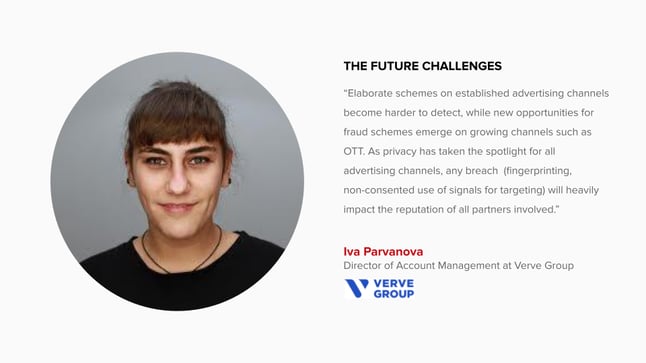

Pixalate spoke with Iva Parvanova, Director of Account Management at Verve Group, about combatting invalid traffic (IVT) and ad fraud within a challenging omnichannel ecosystem.
Iva Parvanova is Director of Account Management at Verve Group, scaling the company's supply growth and maintaining partnerships with premium global publishers. As a digital advertising expert, Iva has worked extensively in the ad tech industry in business development and account management.
Apart from advertising, Iva is passionate about creating equal educational opportunities for all, and leads the fundraising efforts for a non-governmental organization called Lillipad. In her free time, Iva can be spotted DJ-ing or flexing her muscles with complicated yoga poses.
See the full Q&A below:
Verve Group is a privacy-first omnichannel ad platform offering programmatic solutions that connect advertisers and publishers to people in real time. For advertisers, Verve Group offers premium brand-safe inventory across channels, in any content category and in all key markets. Advertisers can leverage first-party SDK signals, as well as our privacy-first contextual data platform to target high-value audience segments. These location-based and contextual audiences can be coupled with our custom mobile ad formats for engaging advertising experiences.
Verve Group tackles fraud with a three-pronged approach: prevention, detection, and reaction.
In the prevention phase, algorithms adaptively learn complex patterns to detect fraud in real-time (pre-bid). We leverage third-party vendors to monitor ad and traffic quality pre-bid, as well as support industry standards such as Sellers.json and app-ads.txt. Additionally, we perform stringent inventory onboarding checks and follow clear content guidelines as well as implement controls for advertisers to add specific inventory to safelists or content categories.
Should there still be instances of fraud, detection plays a crucial role in ensuring the supply chain remains clean. We leverage tools such as Pixalate’s post-bid IVT scanning and Pixalate Analytics to monitor capabilities to block invalid traffic more effectively across display, in-app, video, and over-the-top (OTT) ad formats
Lastly, we realize that there’s no substitute for human intelligence. In addition to using deep learning, Verve Group relies on human intervention to weed out any instances of fraud, by performing internal checks on the invalidity of incoming requests to ensure that buyers receive the right data signals
Fraud exists across channels, with new schemes emerging constantly. We follow these three steps across our entire advertising stack to combat the threats:

Privacy is a complicated yet essential aspect in the advertising ecosystem, and is one of the core tenants of our mission. We comply with global governmental regulations: GDPR, CCPA, and LGPD, while bringing our privacy-first mindset to our programmatic offerings: with growing concerns over transparency and user privacy, we pride ourselves on being a consumer-first omnichannel ad platform — a platform that is gaining clear support from many of the world’s leading advertisers and publishers. We are committed to the cause, having built our proprietary privacy-first audience solution ATOM (Anonymized Targeting on Mobile) for cohort-based targeting in a world without personal identifiers. We also recently acquired the next generation data platform Beemray, which focuses on contextual audiences, built in real-time, across channels.
Brands and publishers can undertake a number of initiatives to make sure they get the most out of their advertising partners.
Fraud is always a security risk. Elaborate schemes on established advertising channels become harder to detect, while new opportunities for fraud schemes emerge on growing channels such as OTT. As privacy has taken the spotlight for all advertising channels, any breach (fingerprinting, non-consented use of signals for targeting) will heavily impact the reputation of all partners involved.
*By entering your email address and clicking Subscribe, you are agreeing to our Terms of Use and Privacy Policy.
These Stories on Case Studies
*By entering your email address and clicking Subscribe, you are agreeing to our Terms of Use and Privacy Policy.

Disclaimer: The content of this page reflects Pixalate’s opinions with respect to the factors that Pixalate believes can be useful to the digital media industry. Any proprietary data shared is grounded in Pixalate’s proprietary technology and analytics, which Pixalate is continuously evaluating and updating. Any references to outside sources should not be construed as endorsements. Pixalate’s opinions are just that - opinion, not facts or guarantees.
Per the MRC, “'Fraud' is not intended to represent fraud as defined in various laws, statutes and ordinances or as conventionally used in U.S. Court or other legal proceedings, but rather a custom definition strictly for advertising measurement purposes. Also per the MRC, “‘Invalid Traffic’ is defined generally as traffic that does not meet certain ad serving quality or completeness criteria, or otherwise does not represent legitimate ad traffic that should be included in measurement counts. Among the reasons why ad traffic may be deemed invalid is it is a result of non-human traffic (spiders, bots, etc.), or activity designed to produce fraudulent traffic.”

